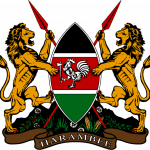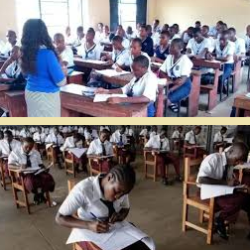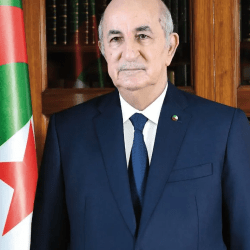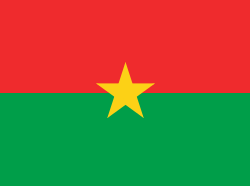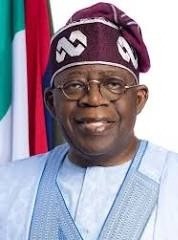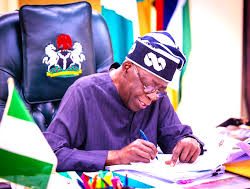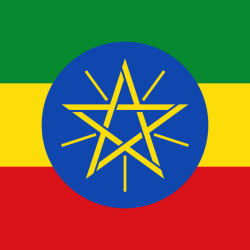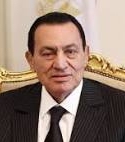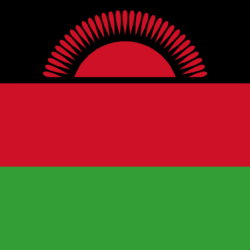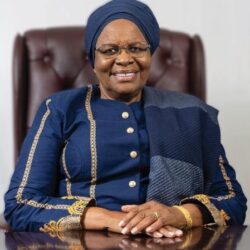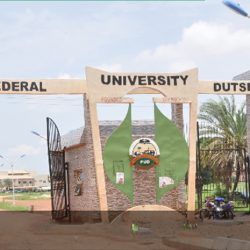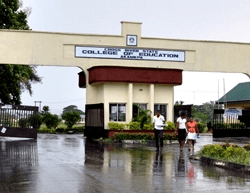Nigeria’s Ministers of Education since 1958 when the Federal Ministry of Education was created are:
| Name | Duration | Party |
|---|---|---|
| Aja Nwachukwu | 1958 – 1965 | NCNC |
| Richard Akinjide | 1965 – 1966 | NCNC |
| Wenike Opurum Briggs | 1966 – 1971 | Military Government |
| Abudu Yesufu Eke | 1971 – 1975 | Military Government |
| Ahmadu Ali | 1975 – 1978 | Military Government |
| Garrick Barilee Leton | 1978 – 1979 | Military Government |
| Sylvester Ugoh | 1979 – 1982 | NPN |
| Bala Usman | 1979 – 1982 | NPN |
| Elizabeth Iyase | 1979 – 1982 | NPN |
| Ihechukwu Madubuike | 1982 – 1983 | NPN |
| L. A. Bamigbaiye | 1982 – 1983 | NPN |
| Sunday Afolabi | 1983 | NPN |
| Alhaji Y. Abdullahi | 1984 – 1985 | Military Government |
| Alhaji Ibrahim | 1985 | Military Government |
| Jubril Aminu | 1985 – 1989 | SDP |
| Babs Fafunwa | 1990 – 1992 | SDP |
| Ben Nwabueze | 1993 | SDP |
| A. I. Imogie | 1993 | SDP |
| Alhaji Dongodaji | 1993 – 1994 | SDP |
| Iyorchia Ayu | 1994 – 1995 | PDP |
| Wada Nas | 1995 | PDP |
| M. T. Liman | 1995 – 1997 | PDP |
| Iyabo Anisulowo | 1997 – 1998 | PDP |
| Dauda Birmah | 1997 – 1998 | PDP |
| A. N. Achunine | 1997 – 1998 | PDP |
| Olaiya Oni | 1998 – 1999 | PDP |
| Alhaji S. Saadu | 1998 – 1999 | PDP |
| Tunde Adeniran | 1999 – 2001 | PDP |
| Lawal Batagarawa | 1999 – 2001 | PDP |
| B. Borishade | 2001 – 2003 | PDP |
| Grace Ekpiwhre | 2003 – 2007 | PDP |
| Ruqqayat Rufai | 2007 – 2011 | PDP |
| Ibrahim Shekarau | 2011 – 2015 | PDP |
| Adamu Adamu | 2015 – 2023 | APC |
| Tahir Mamman | 2023 – 23 October 2024 | APC |
| Morufu Olatunji Alausa | 23 October-Present | APC |
The Federal Ministry of Education in Nigeria was established in 1958, underscoring the nation’s strong commitment to education and development. This significant milestone took place during the administration of Sir Abubakar Tafawa Balewa, who served as Nigeria’s first Prime Minister. His leadership marked a crucial era in laying the foundations for national progress, with education positioned as a key driver for growth and unity in the newly independent nation.
The ministry is tasked with the crucial responsibility of formulating policies, creating rules, and establishing guidelines that shape the educational landscape of Nigeria. Its role includes ensuring compliance with national educational standards and fostering collaboration with various educational agencies and institutions. Through these efforts, the ministry seeks to provide equal opportunities for learning, improve literacy rates, and promote a culture of innovation and development across the country.
Over the years, the Federal Ministry of Education has witnessed numerous leadership transitions, reflecting the dynamic and often turbulent nature of Nigeria’s political landscape. Each administration brought unique perspectives and priorities, contributing to the evolution of the educational system. These changes often influenced policy direction, funding allocation, and the overall approach to addressing the challenges of education in a diverse and populous nation.
Today, the Federal Ministry of Education continues to play a pivotal role in shaping the future of Nigeria. It remains committed to improving access to quality education, supporting teacher development, enhancing infrastructure, and promoting technological integration to meet the demands of a modern society. By prioritizing education as a tool for national development, the ministry reinforces Nigeria’s vision for a prosperous and self-reliant future.
Aja Nwachukwu: Nigeria’s first Minister of Education
Aja Nwachukwu, an Igbo politician and a prominent member of the National Council of Nigeria and the Cameroons (NCNC), served as the Federal Minister of Education from 1958 to 1965. His tenure was marked by significant strides in advancing Nigeria’s educational framework and laying the groundwork for a unified system of learning.

Among Nwachukwu’s notable contributions was his role in shaping leadership at two of Nigeria’s premier universities during a crucial period of national development. In 1962, he was instrumental in the appointment of Professor Eni Njoku as the first Vice-Chancellor of the University of Lagos. A year later, in 1963, he facilitated the appointment of Professor Kenneth Onwuka Dike as the Vice-Chancellor of the University of Ibadan. Both men, highly accomplished academics, were of Igbo descent, reflecting Nwachukwu’s influence in championing excellence and representation within Nigeria’s academic institutions.
Controversy and Regional Tensions
While Njoku and Dike were undoubtedly qualified for their roles, their appointments sparked controversy, particularly among Yoruba politicians and intellectuals of the time. Critics pointed out that more senior Yoruba academics, such as Professor Oladele Ajose, Nigeria’s first tenured professor and a distinguished public health expert, were overlooked for these key positions. This perceived marginalization heightened regional and ethnic tensions, as appointments to high-profile roles were often viewed through the lens of political and ethnic representation.
In 1965, following a cabinet reshuffle that replaced Aja Nwachukwu with Chief Richard Akinjide as the Minister of Education, the controversy took a new turn. Under Akinjide’s leadership, the University of Lagos Governing Council refused to renew Professor Eni Njoku’s tenure as Vice-Chancellor. Instead, Professor Saburi Biobaku, a respected historian and an Egba man from Igbore, Abeokuta, in present-day Ogun State, was appointed to the position.
The Significance of Biobaku’s Appointment
Biobaku’s appointment symbolized a shift in the political dynamics of the time, with power and influence tilting toward the Yoruba political elite. A former student of Cambridge University and a renowned scholar, Biobaku was well-regarded for his academic contributions and administrative capabilities. However, the circumstances of his appointment reignited ethnic tensions, as many Igbos perceived the decision as politically motivated and a rejection of Nwachukwu’s earlier policies.
These events underscore the complex interplay between politics and education in post-independence Nigeria. While Aja Nwachukwu’s appointments highlighted his commitment to academic excellence, they also exposed the fragility of national unity in a country deeply divided along ethnic and regional lines. The fallout from these decisions reflected broader challenges in balancing meritocracy with the demands of representation and inclusivity.
Nwachukwu’s legacy, however, remains significant. His efforts to promote education and advocate for competent leadership in Nigeria’s academic institutions laid a foundation that continues to influence the country’s educational landscape. At the same time, the controversies of his tenure serve as a reminder of the importance of fostering equity and understanding in nation-building efforts.
Political Career
Nwachukwu’s entry into politics was driven by a desire to improve social welfare and education in Nigeria. As a member of the National Council of Nigeria and the Cameroons (NCNC), one of Nigeria’s prominent political parties, he quickly rose to prominence. He served in the Eastern House of Assembly, where he gained recognition for his commitment to promoting education and development. In 1958, he was appointed Minister of Education in the federal cabinet led by Sir Abubakar Tafawa Balewa, becoming the first person to hold this vital portfolio.
Contributions to Nigerian Education
As Minister of Education, Nwachukwu implemented transformative policies that sought to expand access to education and improve its quality across the country. His notable achievements include:
- Expansion of Schools: Nwachukwu spearheaded efforts to build primary and secondary schools across Nigeria, ensuring that education was available to more children, particularly in rural and underserved areas.
- Teacher Training: Recognizing the shortage of qualified teachers, he initiated programs to train and certify educators. Teacher training colleges were established to produce skilled professionals who could meet the growing demands of the education sector.
- National Curriculum Development: He advocated for the creation of a unified national curriculum that reflected Nigeria’s rich cultural diversity. This curriculum emphasized the inclusion of local languages and histories while also maintaining global relevance.
- Promotion of Technical Education: Nwachukwu championed technical and vocational education as a means of equipping young Nigerians with practical skills for economic development.
- Higher Education: His tenure saw increased support for higher education institutions, including universities and colleges, to produce a generation of educated leaders and professionals.


